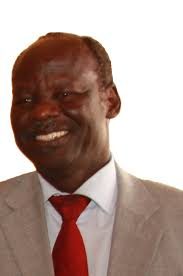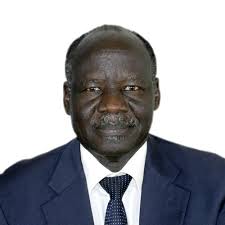NO SAINTS IN SECULAR PUBLIC AFFAIRS, LEAST OF ALL IN POLITICS.

The SPLM-IO issued a press statement on the 3rd instant branding the idea of a technocratic government during the transitional period as “a political gimmick” because there are no saints to act as such. One would have assumed that the paper was a personal opinion of the author, Oyet Nathaniel Pierino, but it was dubbed a “Press Statement” with the full logo and flag of the SPLM-IO and his signature and official title appended. Therefore, it is fair to take it that it was an official SPLM-IO position. It is mind-boggling why an organization worth it mettle would choose to lambaste an idea rather than defending its own position. Worst still why it would give a written blanket condemnation of the technocrats in the country as corrupt and tools in the hands of the regime or the Jieng Council of Elders or both. The arguments put forward are a motley of half-baked ideas, half-truths bordering, in some cases, on lack of grasp of the issues under discussion.
The Press statement has the following to say about the technocrats and the technocratic government:
- Technocrats’ government remains highly imaginary and would play in(to) the hands of the Jieng Council of Elders
- Technocratic government is characterized by “paper works or scientific methods of governance” which cannot address the ills of the country.
- The technocrats cannot govern for they have no political constituencies and military control of the fighting forces
- South Sudan has an acute lack of capacity. Hence no technocrats are there to form a government
- Technocrats in the country are corrupt and have been tainted and compromised by the regime.
- Technocratic government…is untenable, for there is no saint in South Sudan.
- Technocratic government is opportunistic and a political hijack of the transitional period.
To begin with, a transitional technocratic government is never imaginary; it was applied with success in Sudan (our former state) twice: in 1964 and 1985. As to how it would play into the hands of the Jieng Council of Elders remained unexplained. These days, the Jieng Council of Elders has become the scapegoat on which all ills of South Sudan are hanged by many a politico. Yes, the JCE has done horrible things but it is not true that every horrible thing was done by the JCE. Scare tactics can never solve problems.
Adopting scientific methods of governance is not a monopoly of technocratic government, but a virtue that must be adopted by any government that is serious about addressing the needs of the population and tackling the issues of development. How would “an inclusive process of nation and state building’” be realized if not on sound scientific methods of governance? Would it be realized through witchcraft or mythology?
That the technocrats cannot govern because they have no political constituencies and military control is an argument that cannot stand close scrutiny. Who has political constituency during the transitional period? Nobody is elected in a transitional government. In fact, one of the main functions of that type of government is to create a level field to carry out a free, fair and credible general election at the end of its term of office so as to usher in the country into a democratic state where the government is elected by the people. To say that the technocrats have no ‘military control of the fighting forces” betrays the thinking of some of our elites who use armed groups as a means to bargain for power. Armed forces should belong to the country not to some warlords. Furthermore, the fact that a technocratic government comes about as a result of the consensus of all stakeholders (including technocrats) should eliminate this element of who controls the armed forces. These forces should pay full allegiance to the government of the day; transitional or otherwise. It is essential to reiterate here that the legitimacy of any transitional government stems not from “political constituencies”, whatever that may mean, but from the consensus of the stakeholders.
The most preposterous statement posited by the SPLM-IO is to claim that “The assertion that South Sudan has sufficient professionals and technical experts to run a government is a political gimmick and fundamentally misleading”. Which South Sudan are they talking about?
South Sudan prides itself of having more than a thousand PhD holders, thousands upon thousands of medical doctors, engineers, agriculturalists, veterinarians, economists, lawyers, teachers, technicians, graduates of humanities, what have you. The SPLM-IO needs to consult the project of South Sudan Skills that was conducted in Nairobi just before the Comprehensive Peace Agreement of 2005 to get these obvious facts into its head. All these persons are not partisan or “tainted and compromised” by the regime. To denigrate the technocrats more, the authors of the press statement state without proof that the majority of the 75 individuals accused of embezzling $4 billion in 2012 were technocrats which assertion runs contrary to what the President himself stated in his letter to them and statement before Parliament. Why would the authors resort to concocting “facts” simply to justify their arguments?
The argument that South Sudan “has the highest levels of illiteracy rate in the world” and hence lacks technocrats, can be reduced to absurdity so easily. If we put aside the available statistics, let us see how this claim runs Suppose the illiteracy rate in South Sudan is 90% (this figure is far higher than the actual one) in a population of 12 million, then the literates would be 1.2 million persons. If the technocrats are just one-tenth of this figure, this will leave us with 120,000 technocrats. Can’t such a number form a government? Suppose further for argument sake that 90% of these are “tainted and compromised” and 90% of the remainder are organized in political parties and movements, still 1,200 technocrats would be qualified to form a government, which is a huge number to choose from.
That South Sudan employed a Rwandese to head its Revenue Authority has nothing to do with the lack of technocrats in the country, but all to do with the employment policies of those who appointed him. The Bank of England is led by a Canadian as its Governor. Does this mean that the English lack technocrats that can do the job?
If the authors are looking for saints among the technocrats, did they do so among the multitude of politicians in the different parties and movements? Or why would we need saints in technocratic governments and not in governments run by partisan politicians?
Again, a technocratic government is described as “opportunistic and a political hijack of the transitional period”. Where does opportunism come from if the technocrats that will be put in charge are selected and approved by the stakeholders? Similarly, from whom are the technocrats hijacking the transitional period? The authors must understand that the technocrats are not coming from outer space but are South Sudanese as much as everybody else is. They have the right to serve their country in any capacity.
Basic principles of debate demand that one tackles the arguments of the opponent on their merits as stated by him/her. Imputing positions that have no relation to the proposal is the height of intellectual deficit.
The SPLM-IO should have explained to the reader why the power sharing that they want this time would lead to a different and better result than the disastrous 2016 which came about as part of a power sharing arrangement, and indeed power arrangements that have been tried on a number of occasions previously. Also to set out how the power sharing would foster the “programme of systematic change”. They are bent to repeat the same thing hoping to get a different result.
Without a drastic change in power configuration , the First Vice President and a couple of Ministers will neither relieve the suffering of the common man and woman in South Sudan nor will it protect the SPLM-IO elites in government from a President bent on creating a one-man’s state by brutal force. Sloganeering without a concrete plan will not work.
Editor’s Note: The views expressed in the “Opinion Page” are solely the opinions of the writers. The veracity of any claims made are the responsibility of the author’s and are not necessarily endorsed by The Malakal Post. The Malakal Post, reserves the right to edit articles before publication. If you would like to submit an opinion article or analysis, please email your article at: info@malakalpost.com















